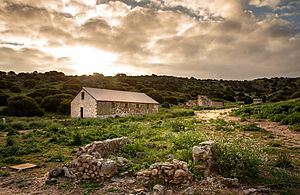Lynton Convict Hiring Depot facts for kids
The Lynton Convict Hiring Depot was an important place in Western Australia's history. It was the first convict depot built far north of Fremantle. This depot operated from 1853 to 1857. It helped provide workers for a lead mine and local farms.
Contents
What Was the Lynton Convict Depot?
The Lynton Convict Hiring Depot was a special camp for convicts. These were people sent from Britain to Australia as punishment. Many of them had a "ticket-of-leave". This meant they could work for settlers and earn money, even though they were still under supervision. The depot was set up on May 22, 1853. Sixty ticket-of-leave convicts arrived on a ship called the Leander. They came with "Pensioner Guards," who were retired British soldiers.
Why Was the Depot Built?
The main reason for building the Lynton Depot was to supply workers. There was a lead mine called the Geraldine Lead Mine about 64 kilometres (40 miles) north of the depot. This mine needed many workers. Local farmers and settlers also needed help with their land. The convicts from the depot provided this important labour.
Life and Buildings at the Depot
By 1856, the Lynton Depot had several important buildings. These included a store, a bakery, a lockup (a small jail), and a hospital. There was also a lime kiln for making lime and an administration block for managing the depot. However, life at the depot was not easy. The convicts often suffered from scurvy. This was a serious illness caused by not having enough fresh vegetables.
Why Did the Depot Close?
The Lynton Convict Hiring Depot did not stay open for very long. Governor Kennedy ordered its closure on January 3, 1857. The main reason was the high cost of keeping the depot running. It was too expensive for the government. Also, the nearby town of Geraldton was growing in importance. There was a greater need for public works and workers in that area. So, the convicts and their officer were moved to Champion Bay (which is now part of Geraldton).
What Remains of Lynton Today?
Even though it closed many years ago, Lynton remains a very important historical site. It is one of the best-preserved examples of a regional convict depot in Western Australia. The site is listed on the Register of the national estate. This means it is protected as an important part of Australia's history. The Northampton Shire Council now looks after the site. The Northampton Historical Society is also working hard to preserve and protect the ruins.
 | William Lucy |
 | Charles Hayes |
 | Cleveland Robinson |


